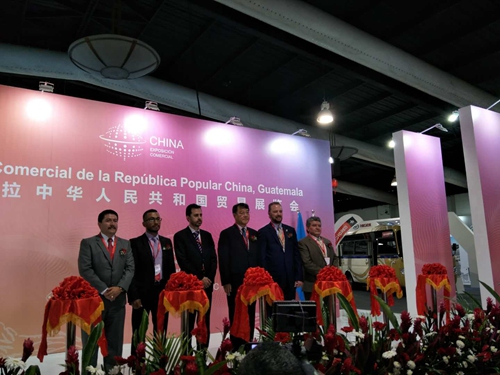HOME >> CHINA
US’ Taipei Act will barely shake countries' growing momentum to recognize China: experts
By GT staff reporters Source:Global Times Published: 2020/4/7 18:13:41

Attendants pose for a group photo at an annual China-Guatemala commercial exhibition held by a nongovernmental organization on September 6, 2018. Photo: Courtesy of Huang Xiaobao
Even during a global pandemic, the US has been leveraging its strategy to disrupt and impede countries' efforts to establish diplomatic ties with the Chinese mainland.Meanwhile, China has stepped up efforts to help Pacific and Latin American countries contain the spread of COVID-19.
Experts said the Taipei Act would have a limited effect to these countries. The influence from the Chinese mainland will keep increasing with deepening cooperation and communication.
On March 26, US President Donald Trump signed into law the Taipei Act, expressing support for the island of Taiwan to strengthen its relationships with countries around the world amid the global struggle against the COVID-19 pandemic.
The bill raised concerns about the lives of Chinese people living in countries maintaining so-called "diplomatic relations" with the island of Taiwan and Chinese enterprises' future in these countries.
Wang Youming, director of the institute of developing countries at the China Institute of International Studies in Beijing, said that the Taipei Act will barely exert influence on Chinese enterprises in these countries as they have been conducting legitimate business operations without any political purposes.
Infrastructure enterprises from the Chinese mainland boast great advantages in the fields of urban construction, solid waste processing and urban illumination, areas in which enterprises from the island of Taiwan and some Western countries cannot compete with, said Wang.
Considering the long-term merits and the benefit to their own country, these countries would happily choose to cut relations with the island of Taiwan and establish diplomatic relations with the Chinese mainland if it were not for these external factors, Wang said.
However, these advantages have always been maligned as surplus production capacity by some Western corporate media. Projects contracted by Chinese enterprises in some Latin American countries have been accused of being a way to transfer this surplus production capacity or damage the environment in these countries.
Yang Zhimin, chief researcher at the Institute of Latin American Studies of the Chinese Academy of Social Sciences said these reports that aims to smear China-built projects are another means to exert pressure on these countries.
Recognizing China is the sole legitimate government representing the entirety of China is an inevitable trend, Yang said.
After the Solomon Islands cut ties with Taiwan Island on September 21, 2019, Taiwan was left with only 15 allies around the world. Nine of them are in Latin America, including Belize where 95 percent of the Chinese living there come from the Chinese mainland. As of September 2019, China has established diplomatic ties with 180 countries.
Yang said that many Latin American countries expect to boost exchanges with China in terms of trade and economy. He said developing the economy and improving infrastructure conditions is an urgent task for Latin American countries to enhance their competitiveness.
Some of Taiwan's "allies" in Latin America are highly dependent on the Chinese mainland for daily commodities and are interested in cooperation with the Chinese mainland in terms of infrastructure construction, Yang said.
Not everyone has bowed down to this pressure.
Panama had maintained a special relation with the US and often "consults" with the US regarding major policies. But Panama didn't give the US a heads up before it established ties with China in June 2017.
Several months after Panama established diplomatic ties with China, the Dominican Republic also made the same decision.
"It has now become a race toward not being the last one with Taiwan," said Jorge Guajardo, Mexico's ambassador to China from 2007 to 2013, Business Insider reported.

RELATED ARTICLES: